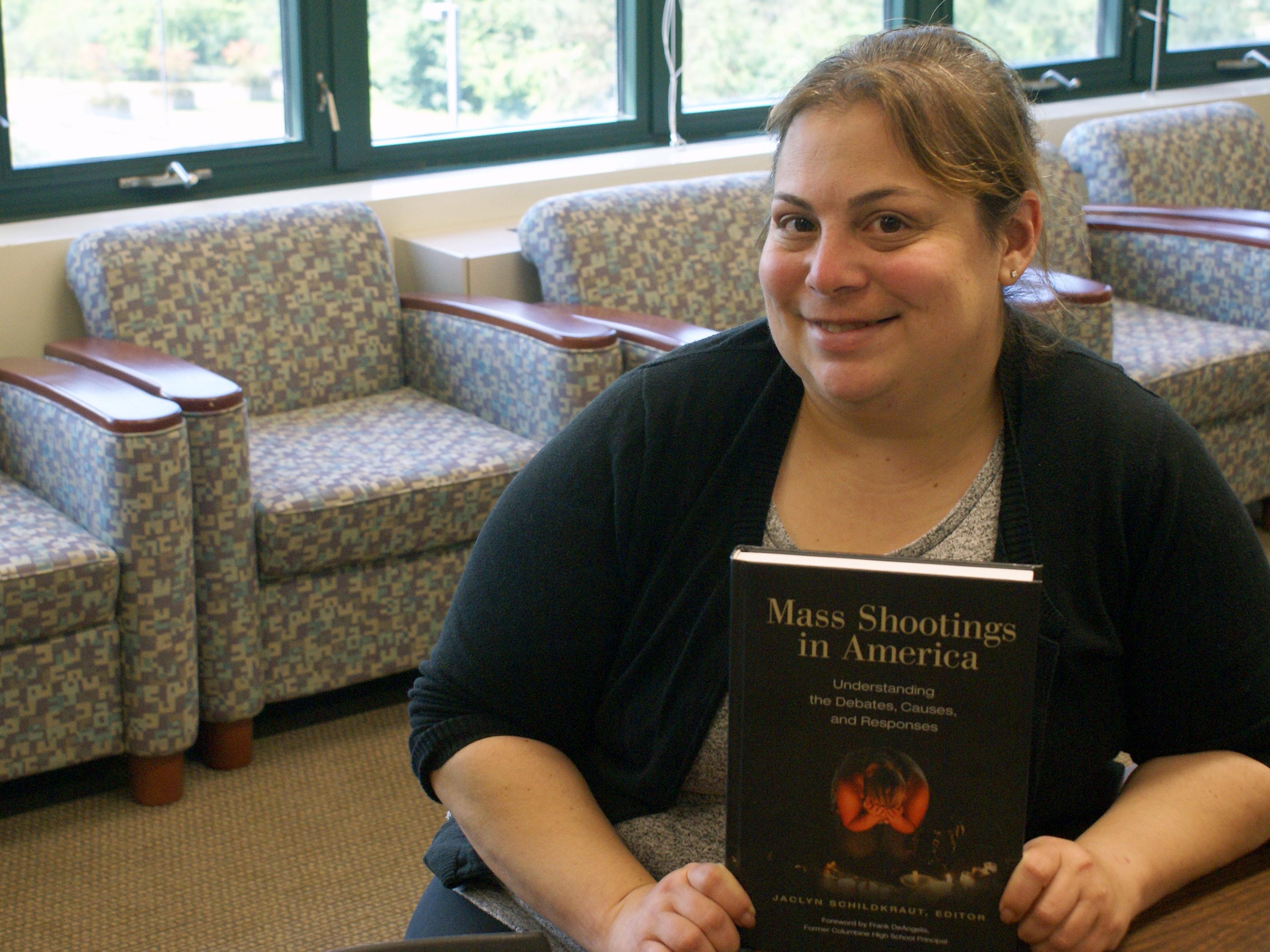SUNY Oswego public justice faculty member Jaclyn Schildkraut, a national expert on mass shootings, recently published a reference book that she hopes will prove helpful for anybody researching the topic.
“Mass Shootings in America: Understanding the Debates, Causes and Responses,” published this summer by ABC CLIO, lays out timelines, documents and the complicated issues behind the continued tragedies in a book spearheaded by Schildkraut but also featuring other expert voices.
“If somebody was going to write a paper on mass shootings, this would be a starting point in a really helpful hybrid format,” Schildkraut said.
Frank DeAngelis, the retired principal at Columbine High School, who wrote the forward for the book, is one of many people in affected communities Schildkraut has developed a meaningful bond with. In that way, this book and her ongoing work transcend research interests into the realm of a very personal mission, she said.
The book contains an encyclopedia of a half-century of mass shootings, from 1966 at the University of Texas to the Orlando Pulse nightclub in 2016.
One section features short articles on topics that make up parts of the puzzle that is mass shootings in America. For this section, Schildkraut said she was able to get “a who’s who of the issues and my dream list of contributors. We got everybody I wanted to participate.” This section looks at the potential impact of such things as firearm availability, mental illness, violent video games, school security staffing and more.
Another section, called “Mass Shooting Questions and Answers: The Experts Weigh In,” includes essays debating hot topics such as gun control, government policies and what preventative measures may or may not exist.
The last section includes pivotal documents, with the most germane excerpts and with references where to find the source material. With the 1993 federal Brady Handgun Violence Prevention Act, for example, the book pulls out the most applicable passages but provides citations for people who want to read the whole original document.
While the book is more about presenting facts and arguments than taking any direct stands, Schildkraut insisted on a “No Notoriety” approach in not focusing on the shooters, and not even naming them except in the encyclopedia section.
“No Notoriety is really important because one of the reasons some of these individuals carry out these attacks is because they want this attention,” Schildkraut explained. “We saw that with the Parkland shooter as well as the Santa Fe shooter.”
The latter gunman “told people when he was taken into custody that he didn’t kill certain people because he wanted them to tell the media what he had done,” Schildkraut said. “By denying shooters this kind of attention, it’s kind of removing that incentive for carrying out their acts.”
Proceeds donated
When she started working on a book on the 20th anniversary of the Columbine shooting, due out in January 2019, she decided to donate any proceeds of her books to causes supporting the victims of these tragedies.
“The proceeds from this book are going to the OnePulse Foundation to help establish and maintain the memorial, once it is actually built” in memory of the victims of Pulse shooting, Schildkraut said of the “Mass Shootings in America” text. Since Schildkraut used to live in Orlando, this tragedy hit even closer to home.
“It seems like the right thing to do,” she said. “I’ve had a lot of people in the communities trust me with their stories and I don’t need to profit from it.”
Schildkraut continues to receive calls for insight from the media, task forces, conference organizers and groups asking her to take part in presentations because, unfortunately, the topic remains timely. In the time between starting the book and the final publication, high-publicity mass shootings including Las Vegas, Sutherland Springs and Parkland took place that she told the publisher they had to acknowledge in some way and required updated copy.
“The publisher has been truly amazing,” Schildkraut said. “They really understood that value of acknowledging these communities. We want to make sure the amount of life lost during these shootings was acknowledged.”




